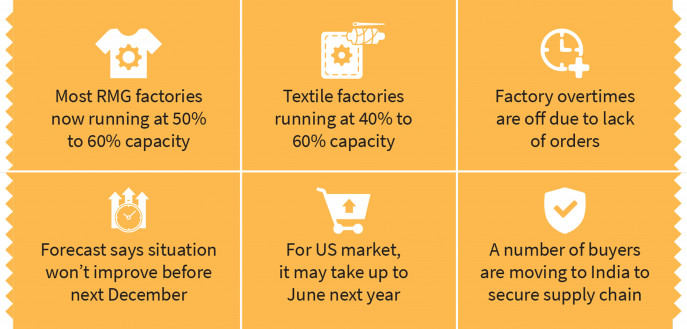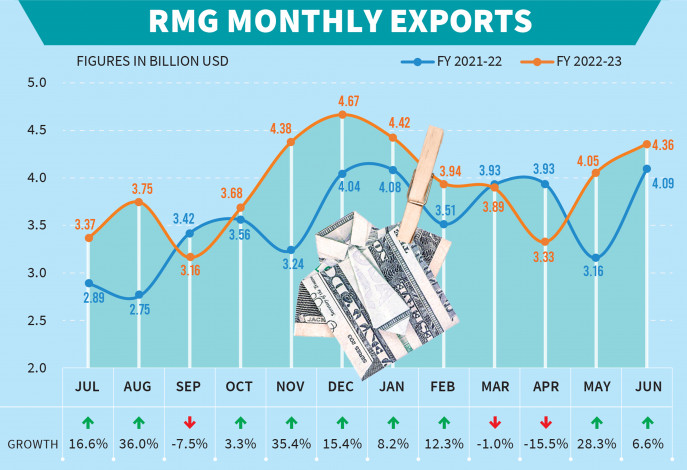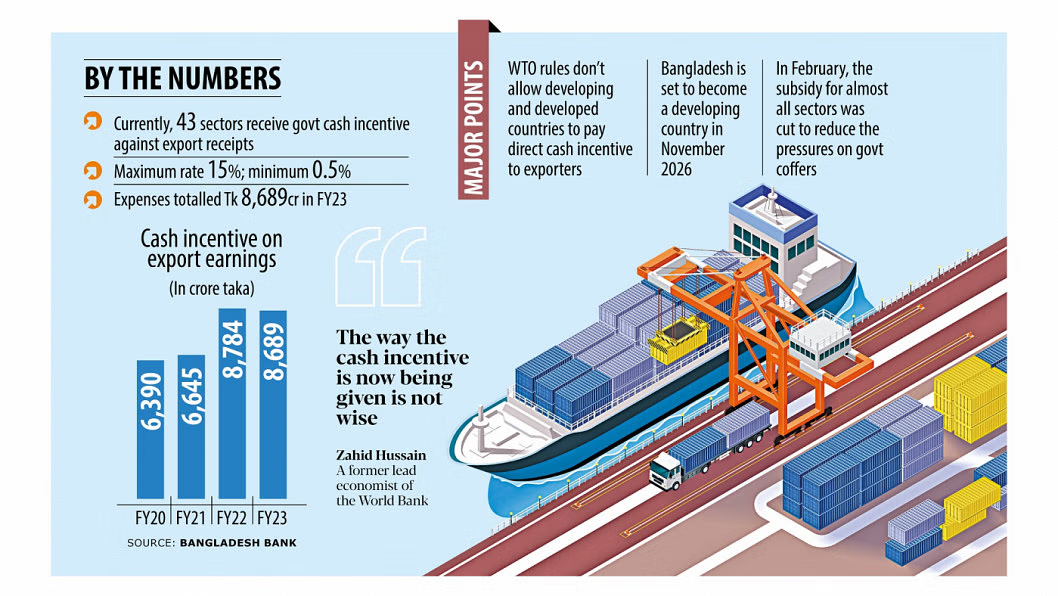The recent surge in political violence in the country has sparked concerns among exporters who are currently operating their factories at least 20% below capacity owing to declining orders from Western markets that are facing inflationary pressures for over a year.
While exporters were hopeful that the easing inflation in the USA and Europe would help in recovering orders, the ongoing political unrest is now seen as a potential risk. This has raised fears among international buyers who are becoming apprehensive about timely shipments of goods, potentially impacting the overall economy.
“We want to maintain the smooth operation of our production lines and shipments,” said Syed Mohammad Tanvir, managing director of Pacific Jeans Group, a prominent Bangladeshi apparel exporter based in the Chattogram Export Processing Zone.
Infographic: TBS
Tanvir, also a vice president of the Chattogram Chamber of Commerce and Industry, urged all political parties to refrain from engaging in activities that could damage Bangladesh’s reputation abroad.
Echoing Tanvir’s concerns, Mohammad Hatem, executive president of the Bangladesh Knitwear Manufacturers and Exporters Association (BKMEA), highlighted the impact of political stability on the economy and exports over the last several years.
He mentioned that during every national election year, apparel exporters experienced a slowdown in orders. Additionally, the ongoing war between Russia and Ukraine has further affected their business.
If the political situation is not good, then the overall situation of the country, business, and trade will suffer – [Jashim Uddin president, FBCCI]
“If political violence continues, international buyers will be worried, affecting our business”, said Hatem, adding, “The apparel exporters will not be able to withstand such a shock amid the ongoing challenges.”
Despite various challenges, in FY23, Bangladesh’s exports recorded a growth of 6.67% year-on-year, reaching $55.55 billion, with the apparel sector contributing 84% to the total earnings. However, this fell 4.28% short of the ambitious $58 billion target due to subdued global demand, economic upheavals, geopolitical crises, and inflationary pressures in Western countries.
AKM Shaheed Reza, chairman of Reza Group, said he was expecting a rise in orders from the third quarter of this year, but the recent political unrest has made many buyers go slow.
“After months’ of efforts, we got approval from a customer recently. But now that customer has told us to wait,” Reza
told The Business Standard.  Infographic: TBS
Infographic: TBS
A joint venture with a Korean company has also slowed down because of the political instability, he noted.
One of the country’s largest textile manufacturers seeking anonymity told TBS that most factories are currently operating at 50%-60% capacity, adding, “Continued political violence would be disastrous for the country’s economy, as the rising utility prices have doubled production costs, and textile millers are facing capital shortages due to slow business.”
An exporter also mentioned that some US buyers recently warned him about potential violence ahead of the national election, prompting them to place orders cautiously.
Western buyers tend to be more cautious during election periods in third-world countries, he added.
Although there were sporadic incidents of politically-charged skirmishes earlier in the year, a sense of political peace prevailed after the announcement of US visa restrictions on 24 May.
However, things changed when the BNP announced its one-point demand to topple the government and restore a non-partisan election-time government, leading to street agitation and rallies from both sides.
FBCCI President Md Jashim Uddin highlighted the critical connection between the country’s political situation and its overall economic health, stating, “If the political situation is not good, then the overall situation of the country, business, and trade will suffer.”
As businessmen, he said, their primary goal is to conduct business in a stable political environment.
He expressed concern that an unstable situation could adversely impact the economy, noting the significant transformation in Bangladesh’s economy over the past decade.
Jasim Uddin also said the importance of avoiding disruptions such as strikes, saying that the current state of the country’s economy cannot withstand such old practices.
“We want a peaceful environment, which is essential for the growth and prosperity of both the economy and businesses,” he said.
Asking for anonymity, the head of business at one of the leading multinational buying houses in the country said a number of buyers are moving to India to secure their supply chain ahead of the election, apprehending political unrest in Bangladesh.
Every buyer wants to source from a stable society, adding that sanctions on some people and visa curb threat by the USA, makes buyers careful, he said, adding that the EU and Canada always follow the USA in international issues.
Economists also voice concerns
Economists also have expressed concerns about the escalating political instability, especially in the context of the upcoming national elections.
They urged all political parties to stage their demonstrations peacefully, as any further unrest may adversely affect the country’s image, leading to a decline in export earnings.
Professor Mustafizur Rahman, distinguished fellow of the Centre for Policy Dialogue (CPD), said the country is facing a crucial time with both local and global challenges impacting economic activities.
He emphasised the importance of political movements, democratic rights, transparency, accountability, and good governance for all political parties.
Mustafizur Rahman also emphasised the need to protect the economy from negative activities and disruptions in the production process.
Dr MA Razzaque, research director of the Policy Research Institute of Bangladesh, points out that any kind of uncertainty is detrimental to businesses.
“Existing macro-economic uncertainties, low reserves, high inflation, and curtailed imports are already affecting businesses.
















